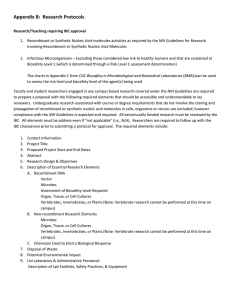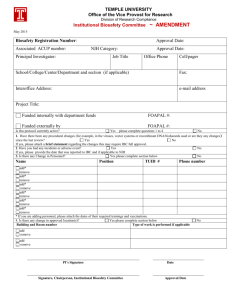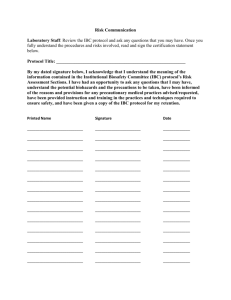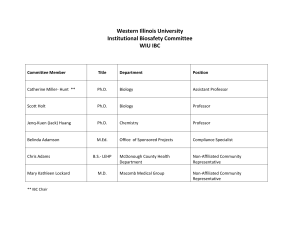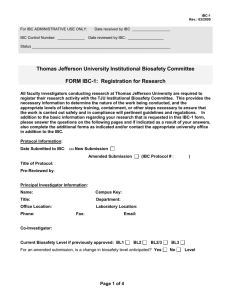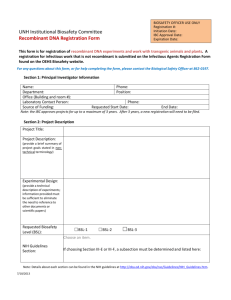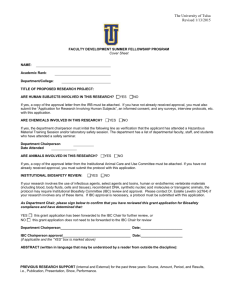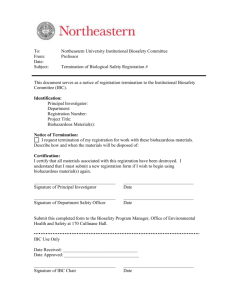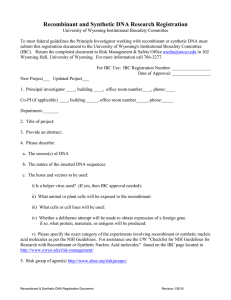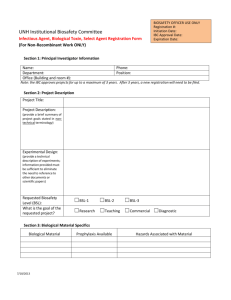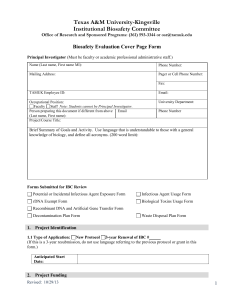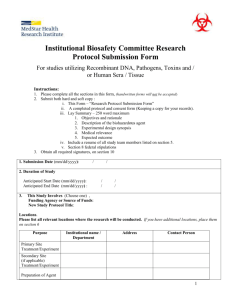Word - Thomas Jefferson University
advertisement
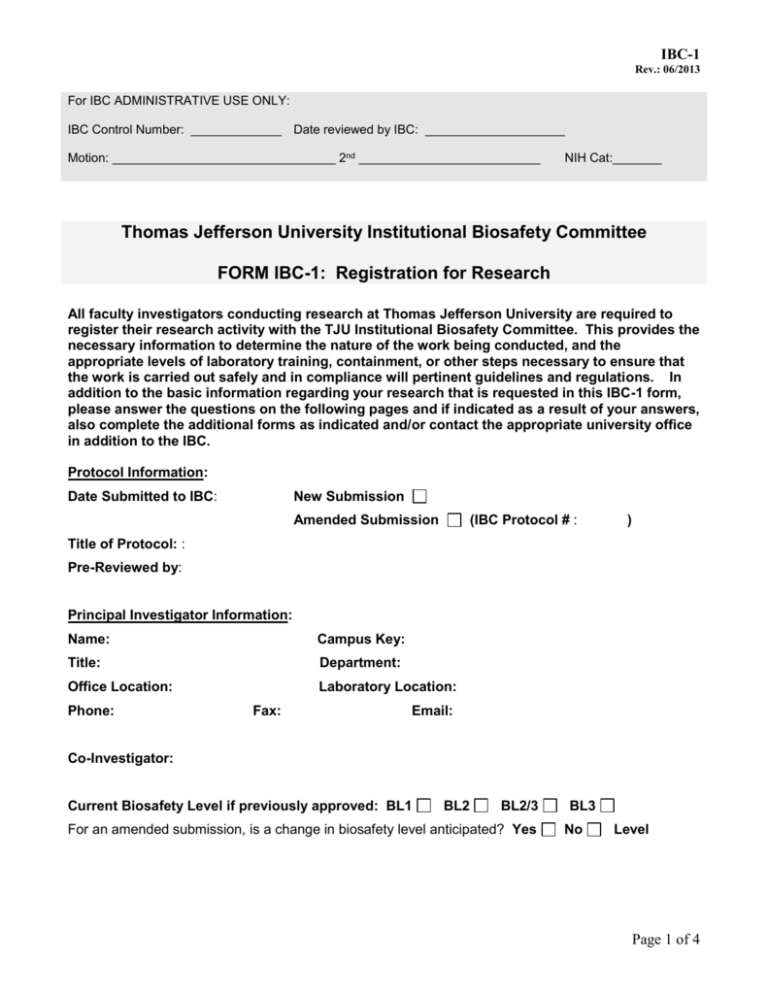
IBC-1 Rev.: 06/2013 For IBC ADMINISTRATIVE USE ONLY: IBC Control Number: _____________ Date reviewed by IBC: ____________________ Motion: ________________________________ 2nd __________________________ NIH Cat:_______ Thomas Jefferson University Institutional Biosafety Committee FORM IBC-1: Registration for Research All faculty investigators conducting research at Thomas Jefferson University are required to register their research activity with the TJU Institutional Biosafety Committee. This provides the necessary information to determine the nature of the work being conducted, and the appropriate levels of laboratory training, containment, or other steps necessary to ensure that the work is carried out safely and in compliance will pertinent guidelines and regulations. In addition to the basic information regarding your research that is requested in this IBC-1 form, please answer the questions on the following pages and if indicated as a result of your answers, also complete the additional forms as indicated and/or contact the appropriate university office in addition to the IBC. Protocol Information: Date Submitted to IBC: New Submission Amended Submission (IBC Protocol # : ) Title of Protocol: : Pre-Reviewed by: Principal Investigator Information: Name: Campus Key: Title: Department: Office Location: Laboratory Location: Phone: Fax: Email: Co-Investigator: Current Biosafety Level if previously approved: BL1 BL2 BL2/3 For an amended submission, is a change in biosafety level anticipated? Yes BL3 No Level Page 1 of 4 IBC-1 Rev.: 06/2013 Lay summary: In layman’s terms (defined as 8th grade education), please provide a description of the purpose and nature of the research to be conducted in your laboratory, not to exceed 250 words. This abstract MUST be written in a manner such that a non-scientist can understand the purpose of the research and the general approach used in the research. __________________________________________________________________________________ Technical Research summary: Please describe the actual procedures to be performed during your research. This does not have to be highly detailed; only enough so that the committee can determine what is being done and, therefore, the associated risks. Please do not exceed 250 words. __________________________________________________________________________________ Page 2 of 4 IBC-1 Rev.: 06/2013 Please answer all of the following questions and provide the additional requested information on the appropriate forms, and/or contact the appropriate university office as indicated. These questions request information that will help to determine the nature of the research being conducted in your laboratory, the types and level of training required, and the biosafety level or other special circumstances required for conduct of the work. Yes No 1. Does your work involve human, animal or plant pathogens, oncogenes, any human-derived materials (cell lines, blood, tissue, body fluids), or biological toxins? If yes, please complete and submit an IBC-2 form with this completed IBC-1 form 2. Does your work involve the transfer of genetic material into humans? If yes, please contact the Institutional Biosafety Officer at 215-503-7422 as this work will require preliminary review by a combined IRB and IBC Committee 3. Does your work involve recombinant or synthetic DNA and/or viral vectors? If yes, please complete and submit an IBC-2 and an IBC-3 form, in addition to this completed IBC-1. NIH Guidelines for work with recombinant or synthetic DNA are available at: http://oba.od.nih.gov/rdna/nih_guidelines_oba.html 4. Does your work involve the use of bacterial or other biological toxins? If yes, please complete and submit an IBC-2 and IBC-14 form in addition to this IBC-1 form. This work may be classified at the BL2 level or higher depending on the toxin. Please contact the Institutional Biosafety Officer at 215-503-7422 for assistance 5. Does your work involve the use of Select Agents? If yes, please complete and submit an IBC-2 form in addition to this IBC-1 form. This work may be classified at the BL2 level or higher depending on the agent. Please contact the Institutional Biosafety Officer at 215-503-7422 for assistance as this work must be registered with the CDC prior to beginning the research, and special training will be required. NOTE: A list of select agents may be found at http://www.selectagents.gov/Select%20Agents%20and%20Toxins%20List.html 6. Does your work involve the use of HIV or agents that may be infectious via an aerosol route? If yes, this work may be classified at the BL3 level and special training will be required 7. Does your work involve non-human primates or non-human primate-derived materials? If yes, please complete and submit an IBC-2 and IBC-4 form in addition to this IBC-1. 8. Does your work involve human cells, pathogens, recombinant or synthetic DNA/RNA in animals? If yes, please complete and submit an IBC-5 form in addition to other forms. Your work must be reviewed and approved by the Office of Animal Resources and the IACUC. Call 215-503-9135 for further information. 9. Does your work involve pathogens, recombinant or synthetic DNA in plants If yes, please complete and submit an IBC-6 form in addition to this IBC-1 form. Page 3 of 4 IBC-1 Rev.: 06/2013 Yes No 10. Does your work involve toxic chemicals? (Please see the guidance documents posted for the IBC-14, which can be found at the same website as the rest of the IBC forms.) If yes, please contact the Institutional Biosafety Officer at 215-503-7422 or the Environmental Safety Office at 215-503-6260 for further instructions. Depending on the nature of the work, you may need to complete and submit FORM IBC-14 in addition to this Form IBC-1 11. Does your work involve the shipping of recombinant or synthetic DNA, pathogens, or biohazardous or toxic materials? Depending on the nature and quantity of the material, special training may be required. 12. Does your work involve the use of Nanotechnology? Page 4 of 4
